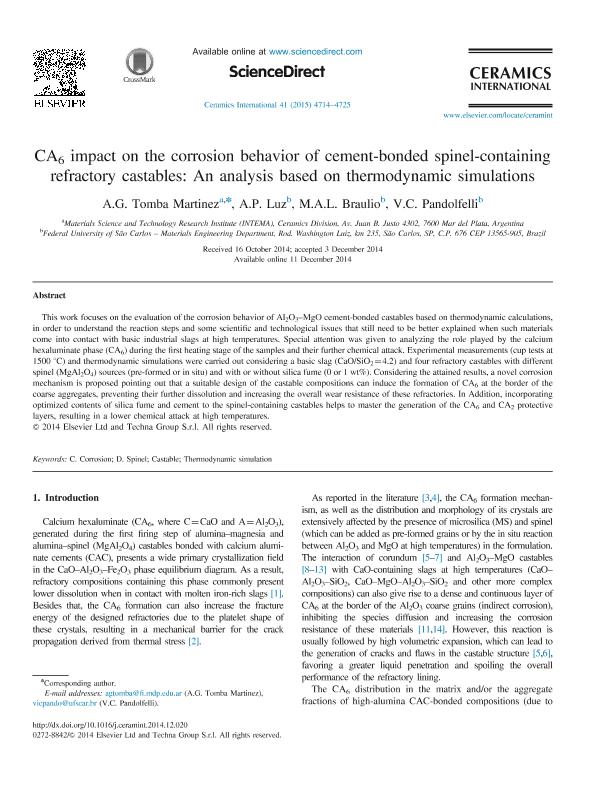Mostrar el registro sencillo del ítem
dc.contributor.author
Tomba Martinez, Analia Gladys

dc.contributor.author
Luz, A. P.
dc.contributor.author
Braulio, M. A. L.
dc.contributor.author
Pandolfelli, V. C.
dc.date.available
2015-11-24T13:54:54Z
dc.date.issued
2014-12-11
dc.identifier.citation
Tomba Martinez, Analia Gladys; Luz, A. P.; Braulio, M. A. L.; Pandolfelli, V. C.; CA6 impact on the corrosion behavior of cement-bonded spinel-containing refractory castables: an analysis based on thermodynamic simulation; Elsevier; Ceramics International; 41; 3; 11-12-2014; 4714-4725
dc.identifier.issn
0272-8842
dc.identifier.uri
http://hdl.handle.net/11336/2882
dc.description.abstract
This work focuses on the evaluation of the corrosion behavior of Al2O3-MgO cement-bonded castables based on thermodynamic calculations, in order to understand the reaction steps and some scientific and technological issues that still need to be better explained when such materials come into contact with basic industrial slags at high temperatures. Special attention was given to analyzing the role played by the calcium hexaluminate phase (CA6) during the first heating stage of the samples and their further chemical attack. Experimental measurements (cup tests at 1500 °C) and thermodynamic simulations were carried out considering a basic slag (CaO/SiO2=4.2) and four refractory castables with different spinel (MgAl2O4) sources (pre-formed or in situ) and with or without silica fume (0 or 1 wt%). Considering the attained results, a novel corrosion mechanism is proposed pointing out that a suitable design of the castable compositions can induce the formation of CA6 at the border of the coarse aggregates, preventing their further dissolution and increasing the overall wear resistance of these refractories. In Addition, incorporating optimized contents of silica fume and cement to the spinel-containing castables helps to master the generation of the CA6 and CA2 protective layers, resulting in a lower chemical attack at high temperatures.
dc.format
application/pdf
dc.language.iso
eng
dc.publisher
Elsevier

dc.rights
info:eu-repo/semantics/openAccess
dc.rights.uri
https://creativecommons.org/licenses/by-nc-sa/2.5/ar/
dc.subject
C. CORROSION
dc.subject
CASTABLE
dc.subject
D. SPINEL
dc.subject
THERMODYNAMIC SIMULATION
dc.subject.classification
Termodinámica

dc.subject.classification
Ingeniería Mecánica

dc.subject.classification
INGENIERÍAS Y TECNOLOGÍAS

dc.subject.classification
Cerámicos

dc.subject.classification
Ingeniería de los Materiales

dc.subject.classification
INGENIERÍAS Y TECNOLOGÍAS

dc.subject.classification
Físico-Química, Ciencia de los Polímeros, Electroquímica

dc.subject.classification
Ciencias Químicas

dc.subject.classification
CIENCIAS NATURALES Y EXACTAS

dc.title
CA6 impact on the corrosion behavior of cement-bonded spinel-containing refractory castables: an analysis based on thermodynamic simulation
dc.type
info:eu-repo/semantics/article
dc.type
info:ar-repo/semantics/artículo
dc.type
info:eu-repo/semantics/publishedVersion
dc.date.updated
2016-03-30 10:35:44.97925-03
dc.journal.volume
41
dc.journal.number
3
dc.journal.pagination
4714-4725
dc.journal.pais
Países Bajos

dc.journal.ciudad
Amsterdam
dc.description.fil
Fil: Tomba Martinez, Analia Gladys. Consejo Nacional de Investigaciones Científicas y Técnicas. Centro Científico Tecnológico Mar del Plata. Instituto de Investigación en Ciencia y Tecnología de Materiales (i); Argentina. Universidad Nacional de Mar del Plata. Facultad de Ingenieria; Argentina
dc.description.fil
Fil: Luz, A. P.. Universidade Federal do São Carlos; Brasil
dc.description.fil
Fil: Braulio, M. A. L.. Universidade Federal do São Carlos; Brasil
dc.description.fil
Fil: Pandolfelli, V. C.. Universidade Federal do São Carlos; Brasil
dc.journal.title
Ceramics International

dc.relation.alternativeid
info:eu-repo/semantics/altIdentifier/url/http://www.sciencedirect.com/science/article/pii/S0272884214019415
dc.relation.alternativeid
info:eu-repo/semantics/altIdentifier/doi/http://dx.doi.org/10.1016/j.ceramint.2014.12.020
Archivos asociados
